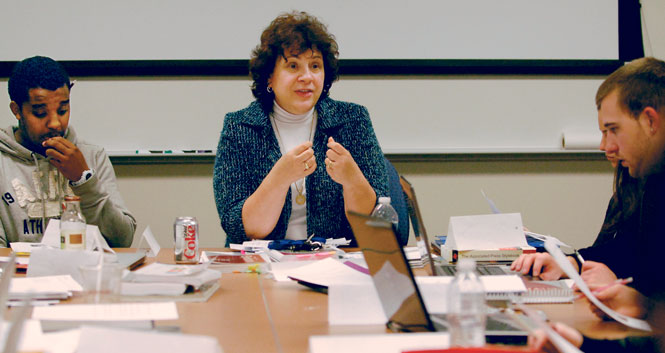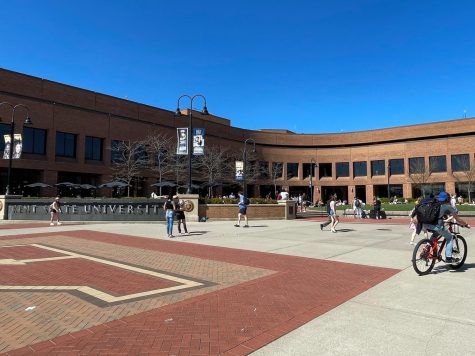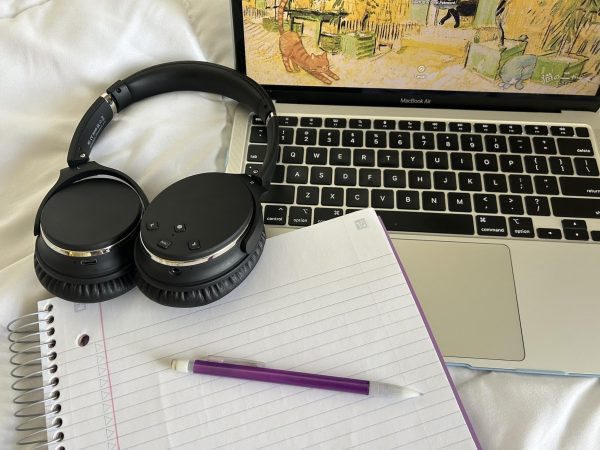Don’t piss off your prof; avoid these common professor pet peeves
jan Leach talks with her students during her Newswriting class on Jan. 24. “It’s just fun to see the way they grasp a concept or the way they apply things,”Leach said. “It’s just energizing to me.” Photo by Nancy Urchak
August 20, 2013
Professors hold high expectations for their students, which means there are certain pet peeves for which professors have little tolerance.
While in class, students should keep the distractions to a minimum, said Lawrence Marks, associate professor of marketing.
“In lectures of 400 people, it’s hard to catch my attention,” Marks said. “But if you do, that means you’re being very disruptive and disrupting those around you. Why come to the class to sleep or text?”
This means professors do notice when students are using their laptops for activities other than note-taking.
“More often than not, students are on their laptops for social media,” said Denise Easterling, entrepreneurship instructor. “It’s distracting and disrespectful. If you really are using your laptop for notes, come and let me know, and that’s acceptable.”
And texting during a lecture is unanimously agreed upon as disrespectful.
Classroom behavior is critically important when discussing serious issues, said Greg Jones, graduate history instructor.
“When students are obviously laughing or smiling when the material we are discussing is obviously not funny, it’s frustrating,” Jones said. “I teach a lot of things about war and people dying, and people are smiling, which makes it obvious that they’re not paying attention.”
Another universal pet peeve common to all professors is frustration over students not reading the syllabus.
“Read the syllabus. It explains everything you need to know,” Marks said. “Don’t come in and say ‘when’s the next test?’ It’s all in the syllabus and online. Don’t ask questions you can easily find the answer to yourself.”
Asking questions, Easterling said, is a great thing, but there is one question by which all professors become frustrated: “Did I miss anything last class?”
“Students ask me this all the time. Of course you did. It’s a bit of an insult to imply that any class time isn’t important,” Marks said.
Easterling said this also occurs when students arrive late to class and ask the professor what they missed before they got to class, which is frustrating to professors who expect their students to arrive on time and ready for class.
Some professors, like Jan Leach, associate professor of journalism, appreciate an email explaining you will be late and the reason why. Otherwise, arriving late is rude, she said.
Other professors are also bothered by the lack of email etiquette displayed by some students.
“Put the class name in the subject line. Professors get hundreds of emails a day, which makes it hard to sort them out. A subject line that says ‘hey’ won’t get read,” Marks said.
Marks also said students should avoid using “text language” in emails, even if you are sending an email from a smart phone. Spelling out words and using punctuation shows professionalism and respect, he said.
Not showing respect for professors is a cause for more aggravation.
“Treat your professors like they’re your boss, and I think that will go a long way when you’re wondering how to address them,” Jones said.
Marks said to respect professors’ appropriate titles, such as “Dr.” if they have earned their Ph.D.
When it comes to grades, these professors have little tolerance for bargaining.
“Almost every time someone wants a change in their grade, I look to see if they’ve done the available extra credit,” Marks said. “You can guess that almost every time, they haven’t done it.”
It is frustrating to professors when students do not take ownership of their grades as well, Easterling said.
“We don’t like the attitude that suggests we ‘give’ you grades,” Easterling said. “You earn points, so you shouldn’t take it personal if you receive a bad grade because that’s what you earned. Students need to take responsibility for the quality of your work and grades.”
Leach said it is also “disappointing” when it is clear students are not making the effort to improve their work.
Some students turn in work with the same mistakes they made previously, which shows they are not making an adequate effort, especially when the mistakes pertain to crucial aspects of their major, Leach said.
Excuses can also cause instructor-student friction.
“I keep my tests open online for multiple days, so when students tell me their computer didn’t work, I can’t believe it didn’t work, or they couldn’t find another one, in the entire eight days,” Marks said.
Acceptable excuses are laid out in the syllabus and student code of conduct and are reserved for serious matters like funerals or illnesses, Jones said.
“Excuses are very frustrating sometimes,” Jones said. “The more elaborate the story, the less likely I am to believe it.”
Contact Christina Bucciere at [email protected].
























